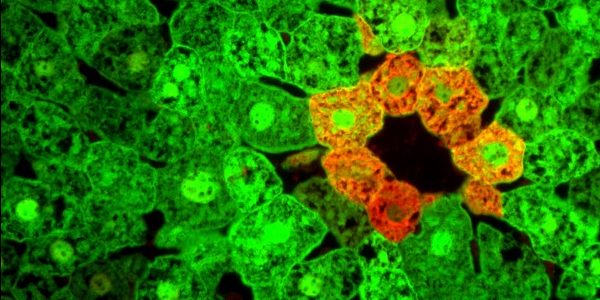$5 million for rare genetic conditions & cancer
Research focused on innovative treatments for cancer and rare genetic diseases has just received a $5 million NSW Government injection.
Four world-class NSW researchers will share in the funding to support trials for cell and gene therapies to treat rare genetic conditions and cancer, such as neurological disease.
Dr Antonio Penna, Executive Director of the Office of Health and Medical Research, said the $5 million boost will support NSW researchers to remain at the forefront of these rapidly-moving fields
“The funding will provide real benefits to patients and improve the quality of health care across NSW,” Dr Penna said.

Liver cells (green) treated with AAV virus (red). Image taken in the Children’s Medical Research Institute lab.
Professor Ian Alexander from the Children’s Hospital at Westmead has been awarded $2 million to develop CAR T cells to target a broad range of paediatric tumours, and CAR T cells to protect kidney transplants from chronic allograft nephropathy, the leading cause of kidney transplant failure.
Professor Alexander said the grant will also develop gene viral vectors to target blinding eye disease and treat childhood kidney disease.
”This grant will enable us to quickly initiate desperately needed paediatric trials for cancer, eye and kidney disease,” he said.
Professor David Gottlieb from Western Sydney Local Health District will receive $1.46 million for a clinical trial to assess if adding cell therapy to standard antiviral treatment for infection in patients after bone marrow transplant leads to better control of serious infections and fewer deaths.
“Bone marrow transplants (also known as stem cell transplants) are the only way to cure the worst types of leukaemia and lymphoma in adults and children. However, patients undergoing bone marrow transplant often die of infection rather than the disease as the patient’s new immune system is immature” Professor Gottlieb said.
“The proposed trial will be the first to examine key issues relating to cell therapies and carries the promise of answering crucial clinical questions and delivering major clinical benefits to transplant patients across the State”.
Associate Professor Greg Neely from The Charles Perkins Centre will receive $810,000 to develop a therapy for treating chronic pain.
A/Professor Neely said “the project will generate GMP-grade clinic ready transplant material and then test the safety and efficacy of this material for progression to human trial”.
“By moving these new technologies to the pain clinic, we can start to provide some relief to patients in NSW and the millions of people world-wide currently living with untreatable and devastating chronic pain” he said.
Professor John Rasko AO from the Centenary Institute will receive $730,000 to identify specific receptors that allow entry of two liver-specific adeno-associated viruses.
Professor Rasko said “we have successfully used an adeno-associated virus to treat patients with haemophilia by delivering a copy of the Factor IX gene to replace a faulty copy in the patient’s liver”.
“This Grant will assist in identifying genetic variants that may affect receptor expression, enabling patients to be screened to identify better responders. It will identify new avenues to enhance therapeutic efficacy in patients undergoing gene therapy” he said.
Gene therapy involves the delivery of DNA into cells. One method is through the use of viruses also called viral vectors. All four of the funded projects will develop manufacturing capacity for clinical-grade gene transfer vectors in NSW.
For more information on each grant recipient’s project please visit the Cell and Gene Therapy Grants page.
Updated 7 years ago